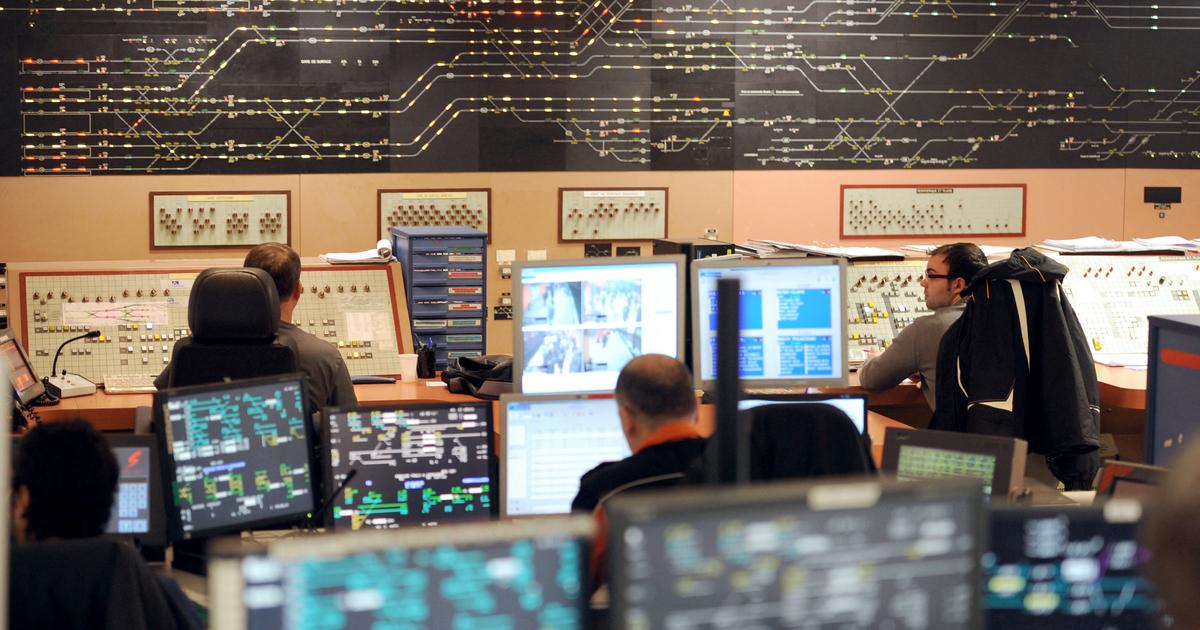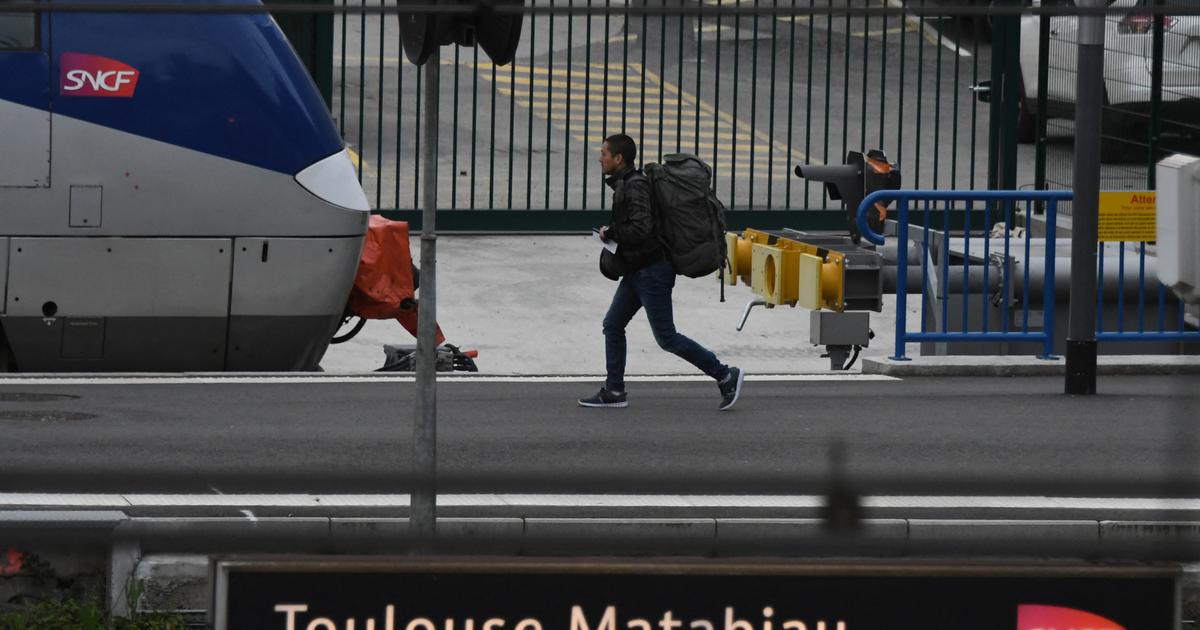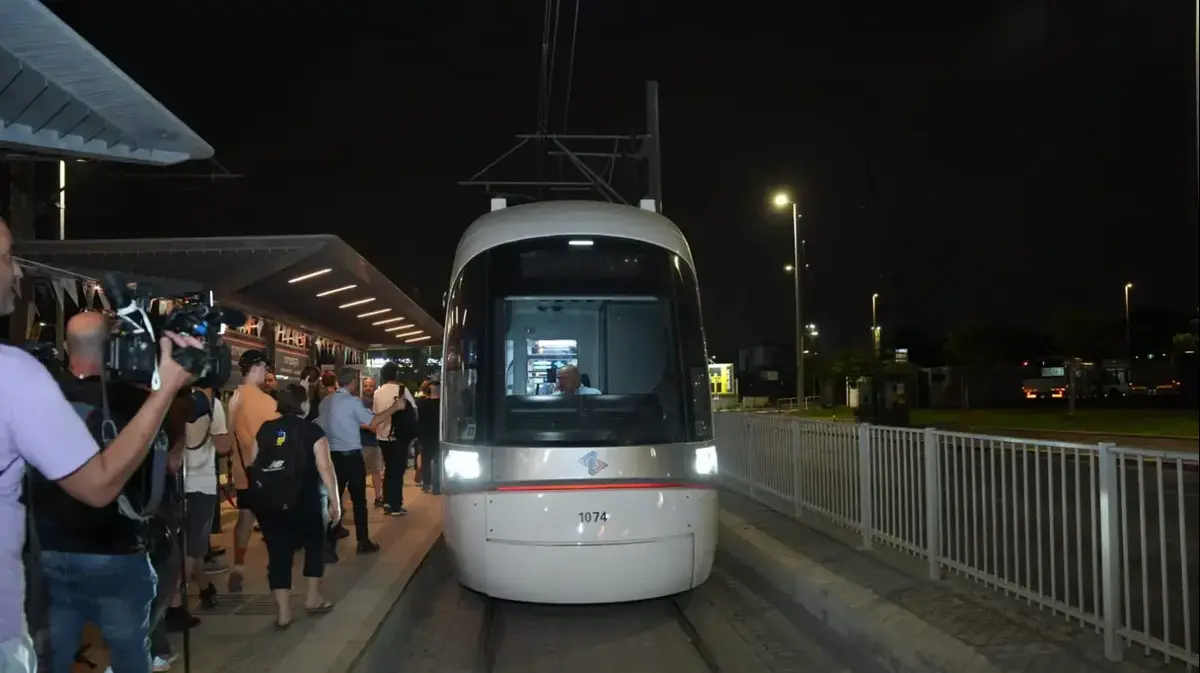Tens of thousands of lives have been lost as a result of the war, millions have been displaced, villages depopulated, roads, bridges, cafes and theaters destroyed, fields rendered useless, crops destroyed and cities laid to waste.
Only one thing has been left largely intact so far: Ukraine's railways.
The intricate rail system of Ukrzaliznytsia, the Ukrainian national railway, spans the country like a web, connecting the major city of Kharkiv in the northeast with Lviv in the west, the border city of Przemyśl in Poland with the port city of Odessa in southern Ukraine .
People are waiting on each section of the network to share with you their fates – that of station manager Olena Franzusova of Mariupol, for example, whose station was destroyed in the war.
Or that of conductor Serhiy, who hath been blinded.
Or that of employee Oleksandr Pyroshkov, who was promoted to become a train driver and was responsible for the evacuation of tens of thousands of people.
The national railway employs more than 300,000 people - conductors and switchmen, accountants, train drivers and electricians.
The company has a rail network of around 22,000 kilometers (13,670 miles), one of the longest in the world, and it moves freight and passengers through a country almost twice the size of Germany.
When Russian troops invaded Ukraine on Feb. 24, some Ukrzaliznytsia employees were among the millions who fled, but most stayed in the country and kept on doing their jobs.
The men and women in their blue uniforms transport the wounded and aid workers, Western politicians and military equipment.
They have saved lives and mourned colleagues who have been killed during the past three and a half months of war.
If Ukraine ultimately manages to prevail over Russia, the men and women of the state railways will have played an outsized role in the victory.
Feb 24: Helping People Escape at Kyiv's Central Station
Oleksandr Pyroshkov is sitting in his apartment not far from Central Station.
It's Feb. 24, and he should actually have the day off. But the Russian invasion of Ukraine began early that morning, with tanks rolling across the border, cruise missiles striking Ukrainian cities and Russian paratroopers landing at Hostomel Airport, less than 40 kilometers northwest of central Kyiv.
Pyroshkov could do the same as many of his compatriots and just flee.
Instead, though, he rushes to work.
The 33-year-old started working for the railroad as a teenager and was a conductor before the war.
But now tens of thousands are pushing westward at a time when many of his colleagues are stuck in occupied areas or in the traffic chaos sparked by the Russian invasion.
Pyroshkov is unceremoniously promoted to become a train driver, with responsibility for supervising all train cars.
And he is assigned to drive a refugee train from Kyiv to the western Ukrainian city of Lviv at 3 pm the next day.
Enlarge image
Oleksandr Pyroshkov in a train at Kyiv's Central Station:
"Our job was to evacuate people."
Photo: Johanna Maria Fritz / DER SPIEGEL
Looking back, Pyroshkov says it was his view that everyone needed to step up and do their part.
Soldiers needed to defend the country, medics were charged with treating the injured, volunteers were monitoring the checkpoints.
And his mission was to help people get out.
"Our job was to evacuate people," he says.
At the start of the invasion, chaos reigned, with the habits of regular operations seemingly thrown out the window.
Obvious things like buying a ticket became optional.
Everything was subsidized by the government to the tune of several hundred million euros.
Overworked, exhausted, and at times under artillery fire, Pyroshkov continues to perform his duties to this day.
Meanwhile, in the fourth month of war, the trains are arriving on time again, but, he says: "It's impossible to forget those moments when missiles and fighter jets fly over your head, when bridges are destroyed. Those won't go away ."
Pyroshkov says his grandfather had told him about World War II and that he thought something like that couldn't happen again in the 21st century.
But it did.
During the first two weeks of the war alone, train driver Pyroshkov and his colleagues with the state railway managed to get 2.4 million people out of danger.
Often, they saved lives.
When a child fell between a train car and the platform, Pyroshkov and his fellow crew pulled the kid out.
When a woman fell on the tracks and fleeing passengers just kept running, they came to her rescue.
There were days when Pyroshkov counted 250 passengers in a compartment designed for 36.
Days of Panic, Lviv Central Station, Feb. 27-28
Thousands of exhausted, freezing Ukrainians are squeezed into Lviv's Central Station at the end of February.
They are hoping to continue towards Poland, Hungary or Slovakia.
Some run across tracks, dragging their suitcases across the rails, with children screaming.
Security guards repeatedly refuse to allow men to continue their journey;
they have to stay and defend the country.
Many are waiting in vain for a seat on a train heading for the border.
Others have decided to stay in Lviv.
One of those is Oleksandra Markevich, who fled Kharkiv in the northeast of the country on the fourth day of the war with her son Basha.
In Lviv, the two now have accommodations in a theater that has been converted into a shelter for refugees.
The 29-year-old keeps in touch by text message with her mother, her two sisters and her niece, who are waiting for their own onward journey at the Kharkiv train station.
These are days full of panic.
"The Kharkiv train station is completely overcrowded," Markevich tells us.
"My niece was almost trampled."
Markevich also left Kharkiv by train.
She took along her grandmother's wristwatchm along with photos and papers, a warm blanket, warm clothes and food for her son.
Basha celebrated his 11th birthday on the train.
Then shells struck near the railroad track, so close that the train shook.
"It's a painful feeling," Markevich says, "when your own child is celebrating a birthday on a train that is under fire."
A Farewell Song – Odessa-Kyiv, March 13-14
A small light is on in the door of car no.
5. Otherwise, the train and the track are completely invisible in the darkness of the night.
Serhiy, the conductor, hears the footsteps and the rolling suitcases long before he sees the passengers.
The song "In the Black Sea," by Soviet chanson singer Leonid Utyosov, wafts softly from the speakers, as it always does when the night train departs Odessa for Kyiv.
Enlarge image
Train conductor Serhiy before departing from Odessa to Kyiv:
The trains operate in darkness to prevent them from becoming Russian targets.
Photo: Emin Ozmen / Magnum Photos / DER SPIEGEL
This bit of tradition has persisted, but all other certainties have been dragged into the abyss of the war.
The stations and tracks are left in the dark, with the lights turned off for safety reasons.
They don't want the railroad to become a target of the air strikes.
Serhiy and his colleagues check passengers' tickets using the light of their mobile phones.
Even during the journey, the lights are kept off, with a dark train rattling through the night, the trip slower than usual.
At the beginning of the war, the railroads introduced a speed limit: 80 kilometers per hour, 60 on particularly troublesome stretches.
Serhiy's train reaches Kyiv the next morning, an hour and a half behind schedule.
The streets in the capital are empty.
Kyiv's defenders are engaged in skirmishes with Russian attackers in the suburbs, who are shelling residential buildings with heavy artillery.
Kyiv withstands the major attack, and the first foreign heads of government travel to the Ukrainian capital: Polish Prime Minister Mateusz Morawiecki, Czech Prime Minister Petr Fiala and Slovenian Prime Minister Janez Janša.
They come by train.
It's faster and safer than by car, and all flights to Kyiv have long since been cancelled.
The Station Chief, Kyiv-Zaporizhzhia, March 18-19
The train doesn't jerk, it almost bounces on the rails.
The walls crack, the seats, upholstered in red leather, crunch.
The fact that the cars don't fly off the rails during the 10-hour night journey from the Ukrainian capital to Zaporizhzhia must seem like a miracle to some passengers.
There are volunteers on board traveling to Zaporizhzhia to assist refugees.
The city has become a focal point for people who have escaped the hell of Mariupol, the port city on the Sea of Azov that Russian troops are bombing to rubble these days.
Olena Franzusova also makes a stop in Zaporizhzhia.
She fled Mariupol, her city of birth, on March 18. She's now living in Uzhhorod in the western part of the country.
Franzusova is 53;
she has been working for the state railway for 27 years, almost as long as today's Ukraine has existed.
She started as a ticket seller at Ukrzaliznytsia and worked her way up to become the station manager at Mariupol.
Franzusova is proud of her job, but the station she managed for nearly a decade no longer exists.
Enlarge image
Former Station Manager Franzusova:
"Our lifeline was cut."
Photo: Private
"I was at home when the war broke out," Franzusova says in a phone interview.
"We heard that the eastern part of the city was being shelled."
Russian troops fired rockets and artillery shells at the city, and yet she and her colleagues still went to work on the first day of the war.
Evacuation trains that had been announced didn't arrive.
Without hesitation, Franzusova and her staff made the decision themselves to let all passengers heading for Kyiv, Odessa and Lviv on board, with or without a ticket.
The last regular train left the Mariupol station a few days later.
Russian bombs had struck the tracks in Volnovakha, a small city located between Mariupol and Donetsk.
The only connection to Mariupol passed through Volnovakha.
"Our lifeline was cut," says Franzusova.
In early March, the station forecourt in Mariupol was hit by an airstrike.
Photos show the destroyed building: shattered windows, a burned-out interior and a clock tower that stopped at just before 4 o'clock.
"We tried to the last man to save the station," she says.
"I've worked there since I was 25. My heart bleeds."
Around the same time, an eight-man mobile command center led by the national railway's chief executive travels across the country to assess the situation.
They visit stations and junctions, inspect sections of track and ask workers what they need to do their jobs.
This provides the company's top management with an overview of the staff's problems and needs.
And yet the mobile team can't be everywhere all at once and can't help in every place.
Olena Franzusova says it hasn't been possible to track down some of her colleagues.
Others were killed: The station's accountant was hit by a piece of shrapnel from a bomb.
The station head in Volnovakha was also killed.
A Shot in the Heart, the Trostyanets Station, March 27
For the first time in a month, people are walking through their city again without fear.
Russian troops had occupied Trostyanets in northeastern Ukraine for almost four weeks.
But the day before, they pulled out of the city, driven out by Ukrainian fighters deploying drones, guns and tanks.
What remains is evidence of war crimes committed and plenty of destruction: civilians shot dead, looted stores, half-smashed buildings.
When the residents see what is left of their station with the forecourt, some stand rigidly, others with tears in their eyes, in front of a site of devastation: shot-up wrecks of tanks, torn-up facades.
The Russian troops used the ticket-counter building as their headquarters, and empty liquor bottles, piles of excrement and smashed furniture are still lying around.
Down in the basement, where the Russians set up a space for interrogation and torture, there is a large roll of plastic bearing the logo of the local cracker and chocolate factory.
The plastic tape was likely used to tie up those who were held in the basement and abused.
At the Trostyanets cemetery, Valentin is standing at the grave of his son Sasha, a 31-year-old railroad employee who had been conducting surveillance on Russian positions for the Ukrainian army.
In mid-March, a sniper's bullet struck him in the heart.
Sasha is one of at least 132 men and women working for the national railway who have lost their lives since Feb. 24, according to the company.
National railway CEO Oleksandr Persovsky estimates that about 20 to 30 percent of them were killed on duty, and the rest were killed at home or at the front.
Under Fire at Kramatorsk Station, April 8
The man from the city administration is standing next to the station hall between hastily covered, mutilated corpses.
He doesn't say much, but ultimately does manage to produce a few words.
"We told them they should wait until the tracks were fixed. Wait, yes, they were supposed to wait."
Waiting to be rescued, waiting to be evacuated from a threatened city in the Donbas.
On the morning of this day, more people than usual were crowding into the station, a product of Russian troops having destroyed the tracks west of the city the day before.
Then, at 10:30 am, the warhead of a six-meter-long Tochka missile detonated above the waiting crowd, spraying thousands of bits of steel.
Nearly 60 people died immediately or in the days that followed from injuries caused by the shrapnel, that literally shredded many of those who had been waiting.
Enlarge image
Volunteer helpers in Kramatorsk
Photo: Juan Carlos / DER SPIEGEL
The fact that this place of rescue could become a death trap visibly affects the men and women of the Ukrainian state railways.
They pride themselves on maintaining train service and a bit of normalcy, even against the backdrop of the constant threat of war.
And now the hope of evacuation hath cost the lives of those waiting.
Meanwhile, Pokrovsk, a short hour's drive southwest of Kramatorsk, is the last station the trains are stopping at. In the cities that are particularly vulnerable to shelling, passengers must henceforth wait underground for their train.
And yet, much of the country's rail network remains intact - it is simply too large to be completely destroyed.
Many sections of the network are beyond the range of Russian artillery, which is also notoriously inaccurate.
Putin's troops can only effectively attack the railway network with precision munitions.
But that is in short supply, making consistent attack impossible.
Living with the War in Przemyśl (Poland)-Odessa, June 2-3
The train is full and almost every seat is occupied.
Even though the war is still raging, railway workers are bringing people back into the country.
A new routine has also been set in among railroad employees.
You could almost call it normally.
Olena now works at the station in Uzhhorod - she's now in the contracts department, but it is still a job.
If she could, she says, she would return to Mariupol tomorrow to help rebuild her old station.
"Even though I know that this city doesn't exist anymore."
Oleksandr Pyroshkov, who had been promoted, is now expected to return to work as a conductor soon.
Some train drivers managed to make it out of Russian-occupied areas and return to duty.
And yet the work remains dangerous for him, too.
Russian missiles are still hitting the train tracks, railroad bridges continue to be blown up and depots are destroyed.
Railroad employees will have to live with the consequences of the war for years to come.
Pyroshkov says that the images and experiences of the war have been burned into his head indelibly.
"My nerves are a wreck," he says.
At night he rests for three or four hours, but no more than that.
"I will never sleep peacefully again," he says.











/cloudfront-eu-central-1.images.arcpublishing.com/prisa/KMEYMJKESBAZBE4MRBAM4TGHIQ.jpg)



